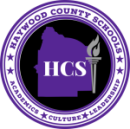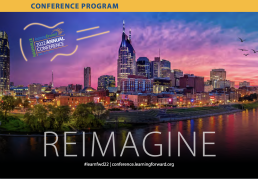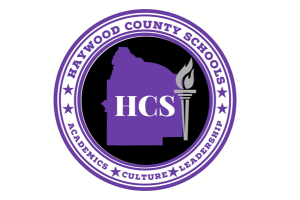HCS Educator Presents at National Conference
Public education is in the middle of a seismic shift. The importance of creating Career/Technical pathways for students is at an unprecedented high. As industry continues to grow and shift toward more programming oriented work, the pace for education to keep up with these changes is rapid.
Even during this period of evolution in education, one constant still remains: reading is fundamental to any and all types of academic success.
There are countless studies that emphasize the importance of a student being able to read on grade level by the time that student is in third grade. Students not on grade level in reading by third grade have a much lower success rate for future academic success. Knowing this data and seeing that many students were behind in reading as they progressed through each grade, Haywood County Schools, in partnership with Instruction Partners, instituted The Reader/Writer Project last school year.
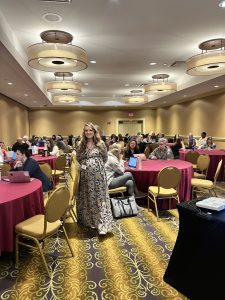 Director of Elementary Education, Sarah Aitken, led the implementation process of The Reader/Writer Project.
Director of Elementary Education, Sarah Aitken, led the implementation process of The Reader/Writer Project.
“We started the Reader/Writer project in 2021. In 2019, we realized what we were using in intervention for our young readers wasn’t really supporting them in building strong literacy skills. We started a conversation with Instruction Partners to see how we could change it,” Sarah said.
In partnership with Instruction Partners, teachers at Anderson Early Childhood Center and Haywood Elementary School began the work of implementing the Reader/Writer Project in their respective schools. At its core the Reader/Writer Project is a 45-minute instructional block dedicated solely to targeted, small-group foundational skills instruction. The instructional time is also individualized to meet each learner’s specific needs.
Students are given a benchmark assessment at the beginning of the year to measure where they are on their personal reading path. From there, students are placed in microphases based on the results of their benchmark assessment. Then, the magic starts to happen.
Cindy Currie is a kindergarten teacher who has seen how the Reader/Writer Project (RWP) has helped her students grow leaps and bounds.
“We start each year by giving a benchmark test and based on those tests, students are placed in microphases. These microphases are learning targets that are specifically for that child depending on their need,” she said. “I make my lesson plans based on where each child is in their microphase. So, during Reader/Writer project time each child is receiving lessons and intervention based on their personal microphase and learning goal.”
The work and preparation for the 45 minute block of the RWP is intense and detailed, but the results are undeniable. Students are given intensive, individualized lessons based on their microphase that allows them to build skills based on where they are as a young reader. Because of this, students are able to learn and build knowledge at a pace that works for them rather than trying to learn at a universal baseline. Cindy has seen firsthand how effective the individualized instruction of the RWP has been for her students.
“I see kids right now who are advancing so fast that I’m constantly changing microphases. I have kids who came into the year on the lowest micorphase – they didn’t know their beginning sounds – and right now these kids know all their sounds and phonemic awareness and now they’re reading,” she explained.
While any Kindergarten teacher would appreciate seeing so much growth, Cindy internalizes the growth on a personal level because she’s seen what it’s like if students aren’t reading on grade level as they age.
Before Cindy was teaching young readers, she taught middle school students. She saw many students who weren’t reading on grade level and was heartbroken trying to figure out the best ways to help them. Reading interventions for older students often fall short because there is so much remediation that has to be done because students were so far behind.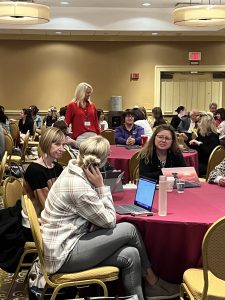
“This is my third year teaching kindergarten, but I was a middle school teacher before that. I was doing intervention for eighth grade students, but saw how much they were missing when it came to reading. That has really helped me to see the importance of what we’re doing now with students at an early age,” Cindy said. “When you have eighth grade boys walking down a sixth grade hall to meet with me because they’re way below where they should be when it comes to reading, it really opens your eyes. This work with the Reader/Writer project is my redemption for those kids we failed. We didn’t fail them on purpose, but now we know how to do better now.”
When work as substantial as this is being done, it’s extremely important to share it. Instruction Partners reached out to Sarah to discuss presenting the success story of early literacy in Haywood County Schools, and she didn’t hesitate when it came to which teacher she wanted to ask to present.
“When we learned about the “Learning Forward” conference, Instruction Partners asked me to find a couple of teachers who could present because we knew the work we were doing was worth sharing,” she said. “We were doing walkthroughs and we went to Ms. Cindy’s class and were blown away when we saw how well everything was working. She had internalized this whole process; her data looked amazing; her students were making incredible gains. So, it was an easy decision for her to be the one to present.”
The Learning Forward Conference was held in December at the Opryland Hotel in Nashville, Tennessee. Teachers from all over the United States and Canada attended in order to learn strategies from districts who were finding sustained success in the implementation of programs that were student-focused and showing academic progression.
“We had people from Canada, from the West Coast, from New Mexico, from New York all at the conference, and we’re very proud of the work being done in Haywood County. We wanted to share our story with them because we have some of the best in the state,” Sarah said.
When Cindy presented to the crowd, she couldn’t help but recall her time as a middle school teacher and the frustration she would see on her students’ faces when they would struggle to comprehend text. She relayed that story to the crowd as she spoke and noticed that it resonated with them, too.
“I shared what it looks like in my classroom on a daily basis and the sense of urgency we have about teaching kids to read. It’s sad when you see kids who are older, and they’re not reading on grade level,” Cindy said. “It was amazing to see the response we had. There were a lot of people that needed to hear this.”
As every district is continuing to find their footing after two abbreviated years of learning due to the pandemic, early literacy in HCS is growing leaps and bounds due to the implementation of the Reader/Writer Project, but also because of the talent of the teachers in the district.
“By the time COVID ended, we had a good plan in place for the next course of action which was the Reader/Writer project,” Sarah said. “We talked about the best practices – phonemic awareness and phonics – that would best prepare our students to be reading on grade level by the third grade. Everything we’ve done has been anchored in the science of reading, and we’ve really seen our young students flourish.”
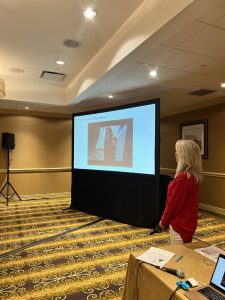 Sarah knows what all educators know – that having the right people in place to implement the programs is more important than simply having the programs. She also knew who to point the audience to when the presentation was over.
Sarah knows what all educators know – that having the right people in place to implement the programs is more important than simply having the programs. She also knew who to point the audience to when the presentation was over.
“I had people ask me some questions, but Ms. Cindy was the expert there. She’s the one doing the work every day, and people at the conference wanted to learn as much as they could from her.”
